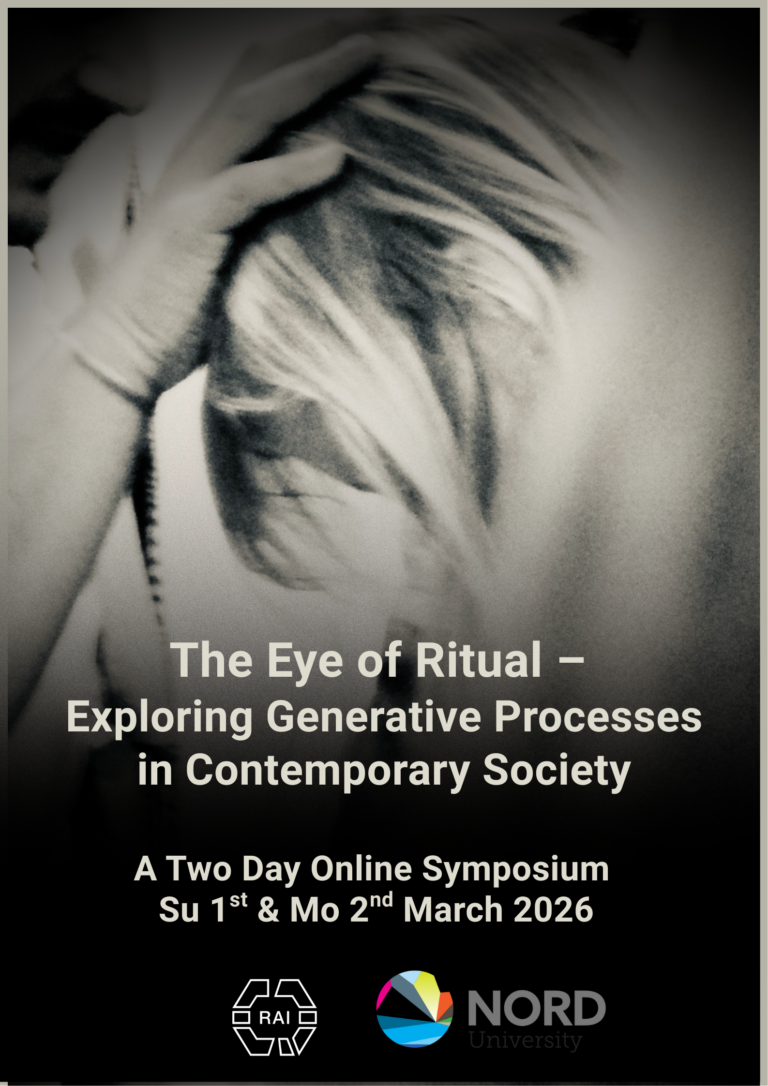NEW DATES!
Sunday, March 1st & Monday, March 2nd 2026
To join via Zoom, please register here
A Two-Day Online Symposium in collaboration with Nord University (Norway)
The Eye of Ritual –
Exploring Generative Processes in Contemporary Society
Organizers: Marianne Blom Brodersen, Bruce Kapferer, and Knut Rio
Programme
Sunday March 1st (Discussants Marianne and Knut)
10.00 – 10.30 Marianne Blom Brodersen Introduction – “The Eye of Ritual”
10.30 – 11.00 Bruce Kapferer Introduction – on contemporary forms of Nihilism
11.00 – 11:30 Emil A. Røyrvik Ritual events of violence and war: On “necro-managerial” spectacles
11.30 – 12.00 Knut Rio Media as phantasmagoric spectacle
12.00 – 12.30 Discussion
12:30 – 13:30 Lunch break
13.30 – 14.30 Steven Friedson Slow Time: The Ear of Ritual (online)
14.30 – 15.00 Liv Haram Womens’ lamenting curse as ‘world-making’: A case of kafara/sacrifice among the Meru-speaking people of Arumeru district in Tanzania?
15.00 – 15.30 Michelangelo Paganopoulos The Ritual Machine and The Cinematic Legacy of Maya Deren: Revisiting Virtuality
15.30 – 16.30 Discussions
Monday March 2nd (Discussants Knut and Marianne)
10:00 – 10:30 Nils Vedal What do people use animism for?
10:30 – 11:00 Olaf Smedal Foodplants must be defended!
11:00 – 11:30 Marianne Blom Brodersen Flamenco as Art and Resistance
11:30 – 12:00 Discussion
12:00 – 13:00 Lunch break
13:00 – 14:00 Gillian Gillison Technology on the rampage (online)
14:00 – 14:30 Bruce Kapferer Artificial Intelligence and Ritual Reasoning
14:30 – 15:30 Discussions
Ritual opens towards horizons of understanding that much anthropology and other fields of academic thought and practice – in their rationalisms of understanding – ignore. Seeing through ritual, as is the point of departure for this symposium, implies opening up for the generatively emerging human experience; the bringing forth and the shaping of social form. With its process-oriented metaphysics, this approach suggests an openness towards the aesthetic dynamics of creative and symbolic processes (Cassirer), of existential bodily beginnings (Merleau-Ponty), of the amalgamation of feeling and form (Langer), and the organic folding and unfolding of human life (Whitehead). With the metaphysical gaze of generative ritual theory emphasis is put on the processual, dynamic, aesthetic and affectual qualities of not only ritual and ritual practices, but social phenomena in general. The idea of seeing through ritual blends artistic and critically engaged anthropology with innovative theorizing to provoke reflection on generative societal phenomena and explore the potentialities of transformative change and world-making. Taking an abductive approach – toing and froing between a range of ethnographic contexts, artistic modalities, critical anthropological theorizing and conceptual innovation – we seek to explore two main trajectories of contemporary societies on a local to global scale.
In the first trajectory we look at the societal diagnosis of modern society as dystopic spectacles – famously presented in Society of the Spectacle (Guy Debord, 1967). We update his ideas with a focus on the generative and transformative potentialities of contemporary spectacles (as explored by Don Handelman) and their tendency towards war, violence and necro-aesthetics. We seek to understand the imagery and structure of these spectacles and their importance for giving representation and form to the current poly-crises of the world today.
In the second trajectory we turn to ritual utopias of life. We look at collective social assemblages designed to unite, share, explore, prefigure, change and enact the very prerequisites of the human condition (as explored by Bruce Kapferer). Rituals are crucial in generating alternatives imageries to those produced through contemporary dystopic necrospectacles. We discuss how ontological technologies of ritual bring forth participatory environments (or ‘communitas’) where members of society can envision, create and experience future possibilities, challenge and disrupt existing paradigms, and foster communal engagement, care and concern. We see such rituals as designs, techniques and methods of deep knowledge, emotionality, experience and experimenting.
We explore the idea that both spectacles and rituals are intrinsically generative by design, either they work in a conserving (representational/functional) or transformative fashion. By doing this we not only challenge canonical forms of ritual/spectacle research that treat them as either representational or functional to the broader social order. We also build on the tradition of generative ritual theorists and associated concepts such as: ‘rites of passage’ (van Gennep); ‘existential beginnings’ (Merleau-Ponty), ‘liminality’ and ‘communitas’ (Turner), ‘virtuality’ and the ‘inner dynamics’, ‘technologies’ and ‘potentialities’ of rituals (Kapferer), ‘ritual in its own right’ – either Moebius-like ‘inward torquing’ or ‘outward twisting’ (Handelman) and the ‘morphologies’ of ritual transformation and generation (Brodersen & Haram). This orientation to ritual/spectacle follows along the lines currently indicated in the work of post-structuralists, especially a post-Nietzschean Deleuzian persuasion (‘critical sites of emergence’), who stress the idea of the social or society as a continual becoming, an open, a virtual in the differentiating process of multiple and shifting affirmations and realizations. This approach to rituals/spectacles goes beyond both conventional and transformative perspectives of such events, with the argument that all rituals and spectacles are – at a certain level – to be understood as moments of immanence, as affirmation and realization of potential and as intrinsically generative/transformative by design.
Join us in exploring the ‘eye of ritual’— the generative core of social phenomena and their capacity to inspire transformative change and worldmaking.


